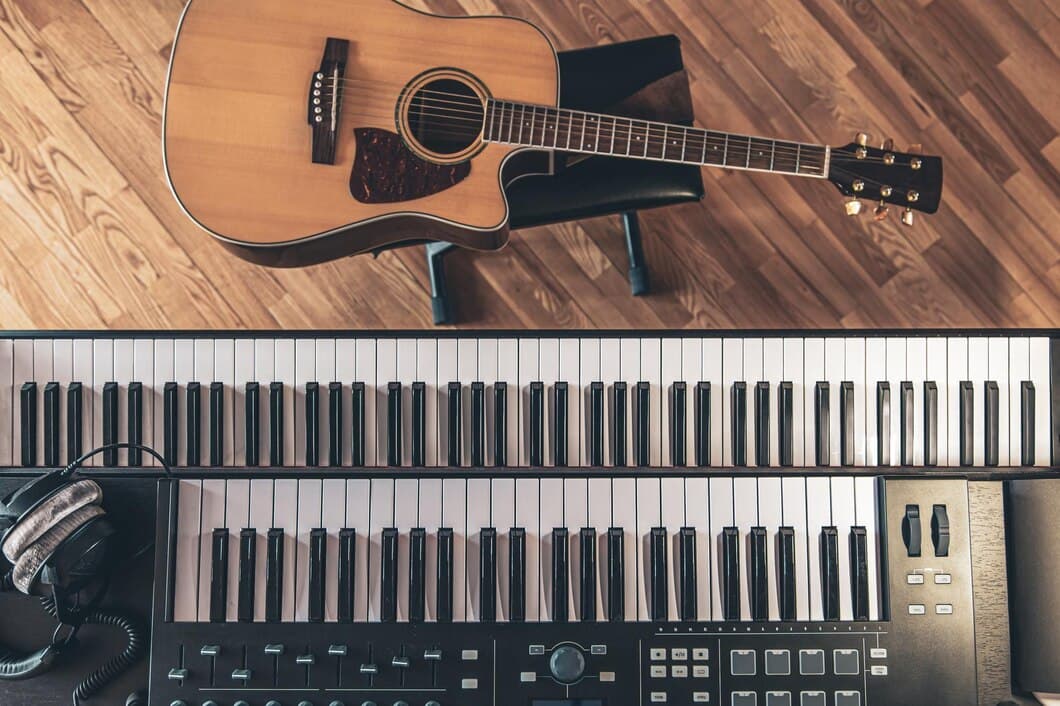What Is The Best Keyboard For A College Student?

Choosing the right keyboard for college can be a daunting task. With so many different options available, it can be hard to know where to start. This article will help you narrow down your choices and find the best keyboard for your needs.
There are a few key factors to consider when choosing a keyboard. First, you need to decide what type of keyboard you want. There are three main types of keyboards: membrane keyboards, mechanical keyboards, and ergonomic keyboards. Each type has its own advantages and disadvantages, so it's important to do your research before making a decision.
Types of keyboards
There are various types of keyboards available, each with its own unique features and benefits. Membrane keyboards are the most common and typically offer a quiet and comfortable typing experience. Mechanical keyboards are known for their durability and responsiveness, but they can be more expensive and produce a louder typing sound. Hybrid keyboards combine elements of membrane and mechanical keyboards, offering a balance of comfort, performance, and affordability.
Ergonomic keyboards are designed to reduce strain and discomfort by providing additional support and adjustability. Gaming keyboards are specifically designed for gaming enthusiasts, offering features such as programmable keys and customizable lighting. Wireless keyboards provide the freedom of movement and can be used with multiple devices. Backlit keyboards allow for easy typing in low-light conditions. Consider these options when choosing the best keyboard for your college needs.
Mechanical keyboards
Mechanical keyboards are a great option for college students who want a durable and responsive keyboard. They are more expensive than membrane keyboards, but they offer a number of advantages, including: greater durability, faster response times, and a more tactile typing experience. If you're a gamer, a mechanical keyboard can give you a competitive edge, as they offer faster response times and greater precision than membrane keyboards.
Mechanical keyboards are available in a variety of switch types, each with its own unique feel and sound. The most common switch types are: linear, tactile, and clicky. Linear switches are the smoothest and quietest, while tactile switches provide a slight bump when you press them, and clicky switches produce a loud click when you press them.
When choosing a mechanical keyboard, it's important to consider your personal preferences. If you're not sure what type of switch you prefer, you can try out different keyboards at a local electronics store. You should also consider the size and layout of the keyboard, as well as the features it offers. Some mechanical keyboards have additional features, such as подсветка, programmable keys, and media controls.
Membrane keyboards
Membrane keyboards are popular among college students because they are affordable, durable, and quiet. They are also relatively easy to clean, making them a good choice for students who are on a budget or who spend a lot of time typing. However, membrane keyboards do not offer the same level of tactile feedback as mechanical keyboards, which can be a disadvantage for some users.
One of the main advantages of membrane keyboards is their affordability. They are typically less expensive than mechanical keyboards, making them a good option for students who are on a budget. Membrane keyboards are also very durable and can withstand a lot of use. They are also relatively quiet, making them a good choice for students who live in dorms or other shared spaces.
However, membrane keyboards do not offer the same level of tactile feedback as mechanical keyboards. This can be a disadvantage for some users, who prefer the feel of a mechanical keyboard. Membrane keyboards also tend to have a shorter lifespan than mechanical keyboards, and they are not as easy to repair.
Ergonomic keyboards

Ergonomic keyboards are designed to reduce the risk of repetitive strain injuries (RSIs) by providing a more comfortable and natural typing experience. They typically feature a split keyboard layout, which helps to reduce wrist strain, and contoured keys, which provide better support for your fingers. Some ergonomic keyboards also include additional features, such as programmable buttons and a wrist rest.
If you're a college student who spends a lot of time typing, an ergonomic keyboard can be a good investment. It can help to reduce your risk of RSIs and improve your overall typing comfort. However, it's important to choose an ergonomic keyboard that is right for you. There are many different types of ergonomic keyboards available, so it's important to try a few out before you decide which one to buy.
Once you've found an ergonomic keyboard that you like, you'll need to adjust to using it. It may take some time to get used to the new layout and key positions, but it's worth it in the long run. With a little practice, you'll be typing faster and more comfortably than ever before.
Factors to consider when choosing a keyboard
When choosing a keyboard, there are several factors to consider to ensure it meets your unique needs and preferences. These include the type of keys (mechanical, membrane, or scissor-switch), the actuation force and travel distance, the layout (standard, ergonomic, or split), the presence of a number pad, and any additional features (such as backlighting, macro keys, or media controls).
The type of keys affects the typing feel and durability of the keyboard. Mechanical keys offer a more tactile and responsive experience, but they can be louder and more expensive. Membrane keys are quieter and have a softer feel, while scissor-switch keys provide a compromise between the two. The actuation force and travel distance determine how much pressure is required to press a key and how far it moves when pressed, which can impact typing speed and comfort. The layout refers to the arrangement of the keys, with standard layouts being the most common and ergonomic layouts designed to reduce wrist strain. A number pad can be useful for entering numerical data, while additional features can enhance productivity or gaming.
Price
The price of a keyboard can vary greatly depending on the features and brand. Wired keyboards are typically less expensive than wireless keyboards. Basic keyboards with limited features can cost as little as $10, while high-end gaming keyboards with advanced features can cost over $100. It is important to consider your budget and needs when choosing a keyboard.
If you are on a tight budget, there are several affordable keyboards available. The Logitech K120 is a basic keyboard that offers good value for the price. The Microsoft Wired Keyboard 600 is another affordable option that is comfortable to use. These keyboards are both under $20 and offer basic functionality.
If you are willing to spend a little more, there are several mid-range keyboards that offer more features. The Logitech G213 is a gaming keyboard that offers customizable backlighting and dedicated macro keys. The Razer Cynosa Lite is another good option for gamers, and it features a spill-resistant design. These keyboards are both under $50 and offer a good balance of features and price.
If you need a high-end keyboard with all the bells and whistles, there are several options available. The Corsair K95 RGB Platinum is a top-of-the-line gaming keyboard that offers customizable backlighting, dedicated macro keys, and a comfortable wrist rest. The Razer Huntsman Elite is another high-end option that features optical switches for faster response times. These keyboards are both over $100, but they offer the best possible gaming experience.
Features
The best keyboards for college students have a number of features that make them ideal for taking notes, writing papers, and completing other academic tasks. These features include a comfortable typing experience, durable construction, and a variety of customization options. Additionally, some keyboards offer additional features such as backlighting, programmable keys, and media controls.
When choosing a keyboard for college, it is important to consider the type of work you will be doing. If you will be doing a lot of typing, you will want a keyboard with a comfortable typing experience. This means that the keys should be spaced well apart and have a good amount of travel. Additionally, the keyboard should be made of durable materials that can withstand heavy use.
If you are on a budget, there are a number of affordable keyboards that offer good features. However, if you are willing to spend a little more, you can get a keyboard with even more features and a better typing experience.
Durability
Durability is a key consideration for college students who need a keyboard that can withstand the rigors of daily use. Look for keyboards with durable materials and construction, such as metal frames and spill-resistant keys. These keyboards are designed to last longer and can handle the accidental bumps and spills that are common in a college environment.
Mechanical keyboards are known for their durability, as they use individual switches for each key. This makes them more resistant to wear and tear, and they can often last for millions of keystrokes. However, mechanical keyboards can be more expensive than other types of keyboards.
Membrane keyboards are a more affordable option, and they are also quite durable. They use a single sheet of material to cover the keys, which makes them less susceptible to damage. However, membrane keyboards may not feel as responsive as mechanical keyboards, and they can be more difficult to clean.
Comfort
Comfort is a key factor to consider when choosing a keyboard for college. You'll be spending countless hours typing papers, taking notes, and coding, so it's important to find a keyboard that's comfortable to use for long periods of time. Some keyboards have ergonomic designs that help to reduce wrist strain and fatigue, while others simply feel good to type on. If you're not sure which type of keyboard is right for you, it's a good idea to try out a few different models before making a decision.
If you're looking for a keyboard that's specifically designed for comfort, there are a few features to look for. First, consider the size and shape of the keyboard. A smaller keyboard may be more portable, but it may not be as comfortable to use for long periods of time. A larger keyboard will give you more space to spread out your hands, which can help to reduce fatigue. Second, pay attention to the key spacing and layout. Some keyboards have keys that are spaced too close together, which can make it difficult to type accurately. Others have keys that are too far apart, which can make it slow and tedious to type. Find a keyboard with a key spacing that's comfortable for you.
Finally, consider the material of the keyboard. Some keyboards are made of hard plastic, while others are made of softer materials like rubber or silicone. The material of the keyboard can affect how comfortable it is to type on. A hard plastic keyboard may be more durable, but it may not be as comfortable to use for long periods of time. A softer keyboard may be more comfortable, but it may not be as durable. Choose a keyboard that's made of a material that's both comfortable and durable.
Conclusion
Ultimately, the best keyboard for a college student depends on individual preferences and needs. Consider factors such as typing style, budget, and desired features. Mechanical keyboards offer durability and a tactile typing experience, but they can be more expensive. Membrane keyboards are quieter and more affordable, but they may not provide the same level of feedback. Wireless keyboards offer portability, but they require batteries or charging. Ultimately, the best way to find the perfect keyboard is to try out different models and see what feels most comfortable and efficient.
Remember to consider ergonomics, as prolonged typing can lead to wrist strain or other discomfort. Look for keyboards with adjustable heights or wrist rests to promote proper posture. Additionally, consider the number of keys and the layout, ensuring it aligns with your typing habits. By taking these factors into account, college students can make an informed decision and choose the best keyboard to support their academic endeavors.
Frequently Asked Questions

Conclusion
Deciding on the best keyboard for college can be a daunting task, but considering your typing style, budget, and specific needs will help you find the perfect fit. Mechanical keyboards offer a satisfying tactile experience but can be noisy and expensive. Membrane keyboards are quieter and more affordable but lack the same tactile feedback. Ergonomic keyboards prioritize comfort and can reduce strain, while gaming keyboards focus on customization and performance.
Ultimately, the best keyboard for you depends on your individual preferences and requirements. Consider your budget, typing style, and specific needs to make an informed decision. Remember to prioritize comfort, functionality, and durability when choosing your keyboard to enhance your college typing experience.




